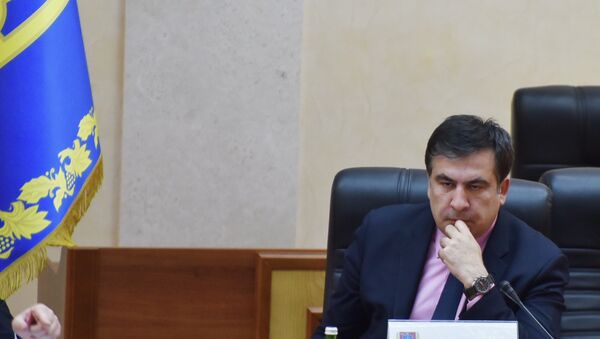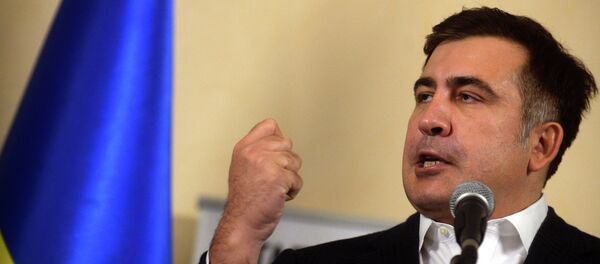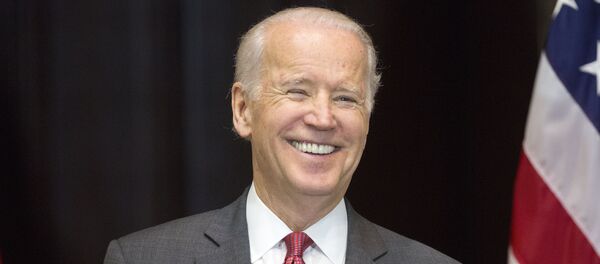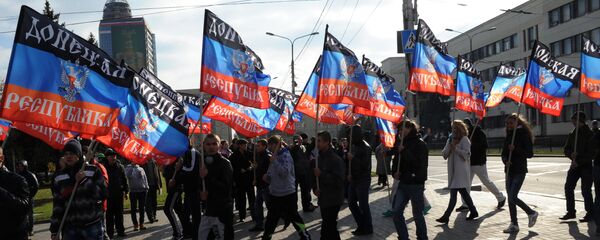Speaking at a press conference Monday, Saakashvili insisted that his resignation was really just the beginning of "a new phase of struggle."
"I will not give up; I am the kind of soldier who will move forward as much as he can, and then as much as necessary," he added. Ukraine's Cabinet of Ministers is expected to formally respond to Saakashvili's request on Wednesday. President Petro Poroshenko has already confirmed that he wouldn't oppose it.
Soon however, Saakashvili and senior Ukrainian officials began trading accusations of massive corruption. The conflict culiminated in an incident where Saakashvili and Interior Minister Arsen Avakov got into a heated spat at a cabinet meeting, with Avakov making fun of Saakashvili's accent and throwing a glass of water in his face.
During Monday's press conference, Saakashvili complained that it had become impossible to deal with corruption at the national level, and accused senior politicians of "betraying the idea of the Ukrainian revolution." The politician-for-hire accused Poroshenko of personally supporting criminal clans in Odessa and compared his corruption with that of former President Viktor Yanukovych, who had been ousted in a coup d'état in February 2014.
A Pot Calling the Kettle Black?
Soon after his appointment, Saakashvili also got into a conflict with regional elites, including Odessa Mayor Gennady Truhanov and Odessa Council Chair Anatoly Urbanski. The governor called Poroshenko out for supporting these officials, who he said were 'criminals, gangsters and kleptocrats'. In recent months, facing wave after wave of corruption allegations from Saakashvili, Kiev struck back, accusing the governor of deliberately undervaluing the privatization price of the Odessa Port Plant by 6.5 billion hryvnia (about $250 million).
Experts suggest that the fundamental reason behind Saakashvili's conflict with Kiev stems from questions over who gets to divide the spoils of corruption. According to Ukrainian political scientist Alexander Dudchak, the current drama is little more than a case of "corrupt Georgian officials getting clobbered by Ukrainian ones."
As far as Saakashvili's legacy in Odessa is concerned, the political scientist stressed that since the goal had always been personal enrichment and political posturing, rather than a genuine improvement of people's lives, it would be foolish to have expected anything positive.
Ukrainian lawmakers and political commentators believe that he is now likely to try to create his own political party inside Ukraine, or ally with other opposition forces on the national level, hence the talk of a "new stage of the struggle."
The chances of Saakashvili returning to Georgia are slim to none, since he remains a citizen of Ukraine, and is still wanted by Georgian prosecutors. In his native Georgia, the politician's decision to resign was taken as a positive step. Education minister Alexander Jejelava said that Tbilisi could only "welcome any step that removes this person from politics."
Coming to power after a color revolution known as the 'Rose Revolution' in 2004, Saakashvili served as Georgian president until 2013. Soon after leaving office, he was forced to flee the country. In the spring of 2014, Tbilisi officially accused Saakashvili of embezzling nearly $5 million from the state budget, the abuse of power, and other crimes.






